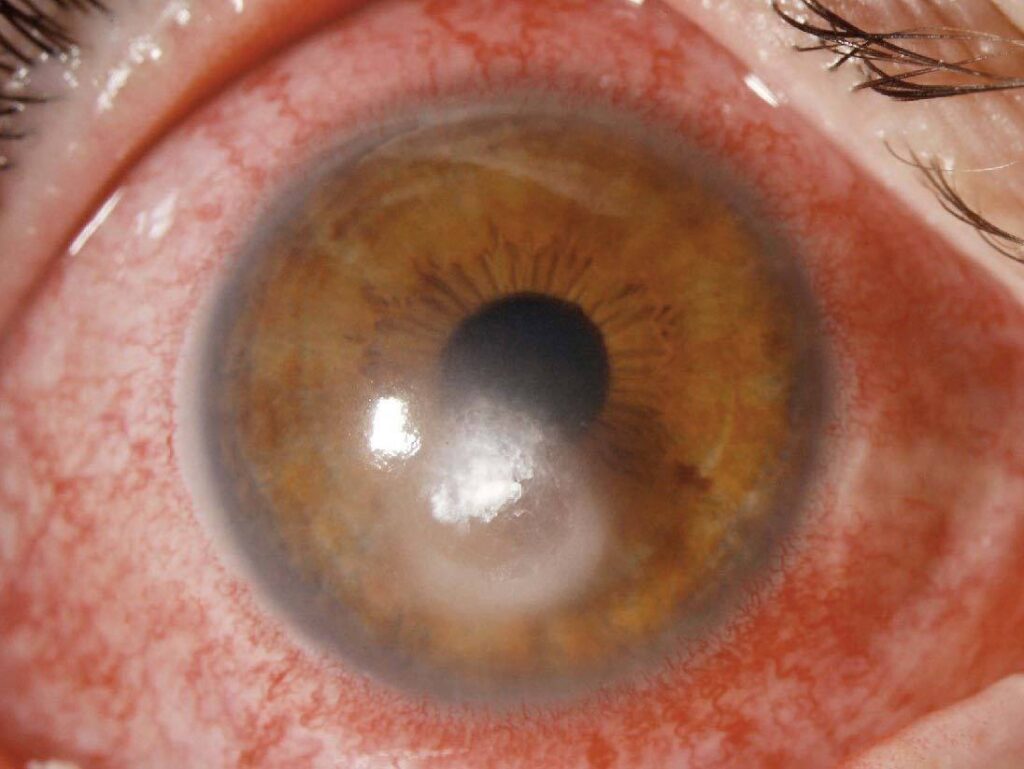A bacterial corneal ulcer, also known as bacterial keratitis, is a serious eye infection that affects the cornea, the transparent front part of the eye. This condition is a medical emergency and, if untreated, can lead to severe complications, including permanent vision loss. Early diagnosis and timely treatment are critical to preserving vision and preventing complications. This article explores the causes, symptoms, risk factors, diagnosis, treatment options, and preventive measures for bacterial corneal ulcer infections.

What is a Bacterial Corneal Ulcer?
A bacterial corneal ulcer is an open sore on the cornea caused by bacterial infections. The condition typically results from an injury, improper contact lens use, or pre-existing eye conditions that compromise the cornea’s integrity. Common bacterial culprits include:
- Pseudomonas aeruginosa
- Staphylococcus aureus
- Streptococcus pneumoniae
- Moraxella species
These bacteria can invade the cornea and lead to severe inflammation, pain, and vision impairment.
Causes and Risk Factors
Causes
The primary cause of bacterial corneal ulcers is bacterial infection. Factors that facilitate bacterial invasion include:
- Trauma to the cornea (e.g., scratches, foreign objects)
- Contaminated contact lenses or solutions
- Pre-existing eye conditions such as dry eye syndrome
- Compromised immune systems
Risk Factors
Certain conditions and habits increase the risk of bacterial corneal ulcers:
- Contact Lens Use: Extended or improper use of contact lenses can harbor bacteria.
- Eye Trauma: Injuries to the cornea create entry points for bacteria.
- Systemic Diseases: Conditions like diabetes weaken the body’s ability to fight infections.
- Dry Eye Syndrome: Insufficient tear production increases vulnerability.
Symptoms of Bacterial Corneal Ulcer
Recognizing the symptoms of bacterial corneal ulcers is essential for early intervention. Common signs include:
- Severe eye pain and redness
- Excessive tearing or discharge
- Blurred vision
- Sensitivity to light (photophobia)
- Feeling of a foreign object in the eye
- A visible white or gray spot on the cornea
Diagnosis
Diagnosing a bacterial corneal ulcer involves a thorough eye examination by an ophthalmologist. Key diagnostic steps include:
- Slit-Lamp Examination: To assess the corneal lesion and determine its size and depth.
- Corneal Scraping: To collect a sample for microbial culture and sensitivity testing.
- Fluorescein Staining: To highlight the ulcer and assess its boundaries under UV light.
Treatment Options
Antibiotic Therapy
Prompt and aggressive antibiotic treatment is the cornerstone of managing bacterial corneal ulcers. Treatment includes:
- Broad-Spectrum Antibiotics: Initially prescribed until specific bacteria are identified.
- Targeted Antibiotics: Adjusted based on culture and sensitivity results.
Supportive Measures
- Pain Management: Using lubricating eye drops and anti-inflammatory medications.
- Avoiding Contact Lenses: During treatment to prevent further irritation.
- Corneal Debridement: In some cases, removing infected tissue enhances healing.
Advanced Treatments
- Steroid Eye Drops: May be used to reduce inflammation after initial infection control.
- Surgical Intervention: Severe cases might require corneal transplantation.
Prevention Tips
Preventing bacterial corneal ulcers involves maintaining good eye hygiene and adopting healthy practices:
- Regularly clean and replace contact lenses.
- Avoid wearing lenses overnight unless advised by a doctor.
- Use protective eyewear to prevent injuries.
- Seek prompt medical attention for eye injuries or infections.
- Manage systemic conditions like diabetes effectively.
Potential Complications
Untreated or poorly managed bacterial corneal ulcers can lead to severe complications, including:
- Corneal scarring
- Vision loss
- Corneal perforation
Pathophysiology of Bacterial Corneal Ulcer
Bacterial corneal ulcers are a severe and potentially vision-threatening condition. Awareness of the causes, symptoms, and treatment options is vital for early detection and effective management. By practicing good eye hygiene and seeking timely medical care, individuals can significantly reduce their risk of developing this serious infection. Always consult an eye care professional for any persistent eye discomfort or vision changes.
myhealthmag

